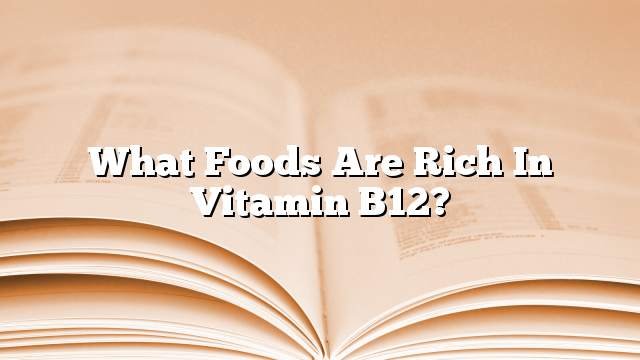Vitamin B12
Vitamin B12 is one of the vitamins B group, one of the vitamins that can be dissolved in water. This vitamin has been discovered in attempts to treat anemia known as malignant anemia which was initially thought to be caused by folic acid deficiency. His treatment was to treat the problem of blood cells, but he did not treat nerve damage associated with this type of anemia.
In 1948, scientists isolated a red complexion from the liver and gave it B12. This new vitamin was found to treat blood cell abnormalities, as well as treatment for nerve damage. The scientists called Cobalamin for this vitamin because it contained cobalt In the middle.
Vitamin B12 and folate are highly correlated with each other to stimulate their work. Vitamin B12 removes the methyl group to activate the folate helper enzyme. In contrast, when folate gives the methyl group to vitamin B12, it also activates the enzyme enzyme For vitamin B12.
The daily requirement of vitamin B12
The following table shows the daily requirements of vitamin B12 by stage of life:
| Stage | Daily needs (microgram / day) |
|---|---|
| Infants 0-6 months | 0.4 |
| Infants 7-12 months | 0.5 |
| Children 1-3 years | 0.9 |
| Children 4-8 years | 1.2 |
| Males and females 9-1 years | 1.8 |
| Males and Females 14 years and over | 2.4 |
| Pregnant women up to 50 years | 2.6 |
| Lactating until 50 years | 2.8 |
What foods are rich in vitamin B12?
The bacteria in the digestive system manufacture vitamin B12, but this vitamin is not absorbed, which is made in this way, and must be obtained from the full needs of food sources, and vitamin B12 is different from other vitamins restricted to exist in animal foods, so people who eat animal foods Simply on their daily needs. Vegetarian foods that may contain vitamin B12 are either obtained by pollution, by bacterial activity or by strengthening. The following sources are rich in it:
- Red meat.
- Liver and kidney meat.
- Fish.
- Poultry.
- the milk.
- eggs.
- Cheese.
Vegetarians who eat milk and eggs also get their vitamin requirements. For vegetarians who do not eat milk and eggs, and people who have a lack of hydrochloric acid in the stomach, which is necessary to absorb this vitamin, they can get their needs by eating products Supported cereals, such as fortified bread, or by eating their food supplements.
Many believe that fermented foods contain enough vitamin B12 due to the manufacture of bacteria, but this belief is not confirmed by scientific analysis. Some analyzes of some fermented foods have shown that the vitamin B12 levels found in them were very few.
Vitamin B-12 differs from other water-soluble vitamins whose loss in microwaves is less than that of conventional cooking methods. It is considered sensitive to microwave radiation, and it should not be prepared or heated with microwaves because it causes damage and loss by turning it into an inactive form. It is also ineffective, and like all other water soluble vitamins, it leaks into the cooking water. Therefore, it can be lost in water-based cooking methods, such as boiling, but in general this vitamin is not lost by cooking if it does not lose water. The food content of this thousand Insurance be linked to protein, however, are the loss of a good amount of it when the pasteurization of milk or evaporated.
At the end of our talk about the sources of vitamin B-12 food, it should be noted that a high proportion of older people, ranging from 10% to 30%, can not absorb the vitamin B12 in food, and therefore prefer to take vitamin B12 supplements after consulting the doctor for their needs from him.
The importance of vitamin B12 for the body
Vitamin B12 plays its essential role in the body by acting as an enzyme that acts as an amino acid, propionate and monocarbon. It plays an important role in the representation of proteins and hemoglobin synthesis in the hemoglobin, and in the formation of proteins and lipids that make up the myelin sheath surrounding the nerves. Vitamin B12 plays an important role with folic acid in the formation of DNA and RNA, and is therefore essential for rapidly dividing cells, such as bone cells, bony cells, and digestive cells.
Symptoms of Vitamin B12 deficiency in the body
Vitamin B deficiency is caused by 12 malignant anomalies, accompanied by damage and damage to nerves. Symptoms of vitamin B12 deficiency include:
- Speed of forgetfulness and short-term memory loss.
- The feeling of numbness in the limbs.
- In advanced cases of untreated vitamin B12, nerve damage can develop after years of paralysis.
- Fatigue and general fatigue.
- In the case of high doses of folate, it helps to hide the symptoms of blood cells related to vitamin B-12 deficiency, which can delay treatment and cause nerve damage before diagnosis.
Vitamin B12 toxicity
Vitamin B12 does not produce any toxicity.
